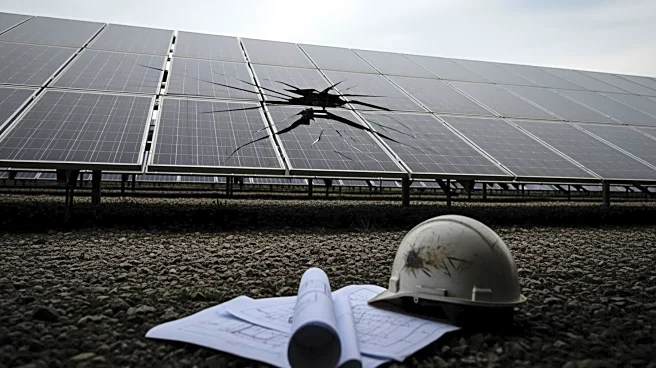What's Happening?
A Chinese-backed solar power project in Bosnia-Herzegovina has encountered significant legal challenges following the death of a construction worker and the discovery of illegal labor practices. The Aurora Solar site near Stolac was halted after authorities
found 71 illegal Chinese workers and initiated investigations into potential misuse of public land. This incident marks a rare setback for Chinese infrastructure investments in the Balkans, which are typically protected by political alliances. Local residents have raised concerns about environmental risks and safety issues, prompting legal actions to stop the project. Despite the legal challenges, the construction site remains active, and the project's future is uncertain.
Why It's Important?
The legal setbacks faced by the Aurora Solar project highlight growing resistance to Chinese investments in the Balkans, which have often prioritized rapid development over environmental and labor standards. This case underscores the potential for local communities to influence large-scale projects, challenging the dominance of foreign investments that may overlook local laws. The incident could lead to increased scrutiny of Chinese projects in the region, affecting future investments and prompting stricter enforcement of regulations. The broader implications may include a shift in how Balkan countries negotiate foreign investments, balancing economic benefits with environmental and social responsibilities.
What's Next?
The ongoing investigations into the Aurora Solar project could result in further legal actions and potentially halt the project permanently. Local activists are preparing additional legal steps against similar projects, aiming to enforce lawful management of public land. The situation may prompt other Balkan countries to reassess their approach to foreign investments, particularly those involving Chinese companies. Increased public resistance could lead to more stringent regulations and oversight, impacting the pace and nature of future infrastructure developments in the region.
Beyond the Headlines
The challenges faced by the Aurora Solar project reflect broader tensions between economic development and environmental sustainability in the Balkans. As Chinese companies expand their presence in the region, they may need to adapt to stricter environmental and labor standards to avoid similar setbacks. This situation also highlights the role of local communities in shaping development projects, emphasizing the importance of public engagement and transparency. The incident could influence China's strategy in the Balkans, encouraging a more sustainable and community-focused approach to investments.















